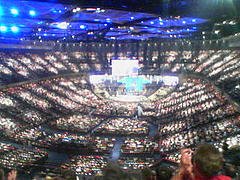 Nietzsche believed that Christ's teachings had been perverted by the Apostle Paul and the early church founders to create the idea of the congregation of believers. He believed that these early church leaders, in an attempt to bring down the Roman empire, purposely created a system of martyrdom, redemption and community in order to bring people under a theological framework that would manipulate them in to eventually causing the fall of the hated Roman Empire. He postulated that they deliberately created a system of thought that subjugated the individual to the will (and in his words, tyranny) of the community. Although he denied the divinity of Christ he admired Christ's teachings and considered him one of the first ubermench or overmen (commonly translated as supermen). Nietzsche believed that the church had deviated from Christ's original teachings in order to subjugate the individual. Of course, Nietzsche also went insane.
Nietzsche believed that Christ's teachings had been perverted by the Apostle Paul and the early church founders to create the idea of the congregation of believers. He believed that these early church leaders, in an attempt to bring down the Roman empire, purposely created a system of martyrdom, redemption and community in order to bring people under a theological framework that would manipulate them in to eventually causing the fall of the hated Roman Empire. He postulated that they deliberately created a system of thought that subjugated the individual to the will (and in his words, tyranny) of the community. Although he denied the divinity of Christ he admired Christ's teachings and considered him one of the first ubermench or overmen (commonly translated as supermen). Nietzsche believed that the church had deviated from Christ's original teachings in order to subjugate the individual. Of course, Nietzsche also went insane.Kierkegaard, although a Christian who believed in the divinity of Christ, also had harsh words for the institutionalization of the Church. He believed that redemption was the story of God's connection with the individual. He believed the congregation of believers subjugated the dignity of the individual (who was made in God's image) to the herd mentality of the church. He believed that church tradition and politics perverted the gospel message of individual freedom and free will. Kierkegaard believed that man-made organizations tended toward despotism and corruption.
Interesting views that both at once contradict and complement each other in different ways. The reason I bring them up is to show that men have been debating the nature of the church for a long time.
I have been growing increasingly frustrated with the role of the church in modern society. The megachurch is the focal point for all that is wrong with modern Christianity. Warm and fuzzy messages of universal acceptance and self-help techniques are destroying the true purpose of the church...to preach and spread the news of Christ's salvation.
In the megachurches of today there is no individual accountability. People can walk in from the street, merge into the faceless crowd, hear an uplifting message with good music and walk straight back into their previous state of sin. Christianity seems to be experiencing a self-esteem problem. We don't want to offend anyone or be labeled judgemental so let's not preach the truth. We wouldn't want to scare people away.
In the megachurches of today there is no individual responsibility. Individuals hidden in the fray of the multitude can easily refrain from taking any part in the building of the Kingdom of God. There are no actions to back up their supposed faith and as James said "Faith without works is dead."
In the megachurches of today politics has insidiously rooted itself to the fabric of the congregation. The congregation is directed to whom and what they should vote for. Any dissent is treated as "unchristian-like." Seperation of Church and State was meant to protect the Church. Now the church openly invites the government into their sanctuaries. "Group Think" runs rampant in today's megachurch environment.
In the megachurches of today administration become the means to control a large grouping of people. Administration leads to the desire to consolidate control. Control is power which leads to corruption and egotism. Today megachurches do not plant churches. They plant new campuses for their home church. Many of these new campuses simply show closed-circuit feeds from the "mother campus." This is not the creation of new communities of believers...this is the extension of control by a ministerial staff swelling with their own self-importance.
Granted many of these problems exist on a smaller scale in smaller churches. However, in the hiarchical framework of the church, it is often the larger churches that guide the agenda. It is the larger churches who have the power and the influence that often sweep the smaller churches in their wake.
What's the solution? I'll post some of my ideas on a later post. I believe in the power of the church. I believe God has called us to worship as a community of believers. But I also believe in the dignity of the individual. To walk the line between community and individualism should not be so difficult. And not all large churches are corrupting the message of the Gospel. However, many are, and that should be disturbing to any follower of Christ.